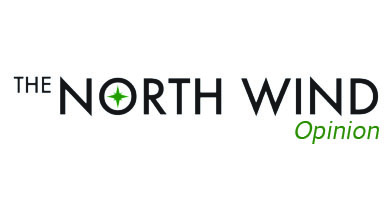You don’t know what you don’t know.
If there is one phrase that has summarized my life and my work, this is it. In my time as a student at Northern Michigan University, I became acutely aware there was much for me to learn, both inside the classroom and out. Through my journalism classes and my work at The North Wind, I learned it was my responsibility to do research to educate myself, knowing there was much I didn’t know.
I also learned the importance of words and the power of language. At The North Wind, my weekly task was to express ideas and stories, whether my own opinion or campus news, in print through words. Now, as the first trans man to make a men’s U.S. National Team, a four-time member of Team USA and recent All-American, I travel the world both to compete and to educate communities on the importance of inclusion in sports, with a specific focus on how language creates environments in athletics.
In the past two years, I have been the subject of many news stories and interviews. As a transgender person, I have had more than my fair share of offensive questions asked of me, and a few intentionally harmful articles and videos pop up in my Google alerts, but a recent incident prior to my visit to campus was among the most disappointing mistakes I’ve seen.
On Monday, I spoke on campus at the UNITED Conference. In the days leading up to the event, I saw a news article about the speakers. I clicked; the first thing I saw was, “Chris Mosier is the first transsexual man…” I stopped. I do not and have not ever identified as a transsexual man. I am a transgender man and my bio sometimes refers to me as a trans man, but the word “transsexual” has never been a part of my narrative and is incredibly offensive to me, as well as many members of the transgender community.
These words are not interchangeable. Transgender can be an umbrella term, referring to many more specific identities within the transgender community. Transsexual falls within that, but not every transgender person is or identifies as transsexual. Transsexual has a negative connotation due to its history as a medical term. For me, it is as derogatory as calling me “tranny.”
This term should not have been used to describe me in a press release from an NMU office. When I read it, I thought, “if this type of mistake is made about an outside speaker coming to campus, what type of harm is being done to transgender, non-binary and gender variant people on campus every day?”
I now know it was an accident and not intended to be harmful, but the impact was such that I changed most of my presentation to address language in response. Language is complicated, and terms can change. Words used to describe the LGBTQ+ community when staff and faculty were students has likely evolved. Identity is personal and can also change over time, but our identities are deeply integrated into who we are, present as and position ourselves as a person within society.
Language shapes environments and can make people feel safe or unsafe, welcomed or shunned. We need to pay attention to our words. This is not a matter of “being politically correct” or “policing people’s language,” it’s a matter of being a good person and respecting people around you.
It is the responsibility of people on campus, particularly those who are interfacing with a diverse student body in person, online or in writing to have the basic understanding of appropriate terminology. In a place of learning, it should be a priority to provide continuous education to faculty, staff and administration— and definitely anyone writing official press releases on behalf of NMU.
Understanding key concepts and terms about LGBTQ+ identity will strengthen the campus community and let LGBTQ+ students, faculty and staff know they are seen and embraced on campus. The UNITED Conference took a good first step on Tuesday, hosting an LGBTQ+ educational workshop, an effort I hope will extend past the willing participants and to the people who need the training most.
We don’t know what we don’t know. But, to truly prepare students for an evolving global workplace, diversity and inclusion must be a priority. Here of all places, we should all know enough to understand that it is our job to fill in our knowledge gaps by seeking resources and information on areas outside of our comfort.
I look forward to seeing the progress made before my next visit to campus.






















